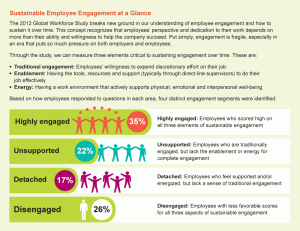by Charles Plant | Sep 17, 2012 | Leaders
 Today is the first anniversary of the day that Occupy Wall Street took over Zuccotti Park and the Occupy Movement was born. As a movement it began over a growing disillusionment about income inequality and corporate greed. While it dominated the world’s attention for many weeks, its impact was short lived. Eventually it lost its momentum, its ability to organize, and was broken up.
Today is the first anniversary of the day that Occupy Wall Street took over Zuccotti Park and the Occupy Movement was born. As a movement it began over a growing disillusionment about income inequality and corporate greed. While it dominated the world’s attention for many weeks, its impact was short lived. Eventually it lost its momentum, its ability to organize, and was broken up.
What doomed the movement was its lack of leadership. Not only did a credible leader not emerge but in fact the movement resisted any attempts by individuals who wanted to lead it. “Without leaders or specific demands, what started as a protest against income inequality turned into an amorphous protest against everything wrong with the world.” (Washington Times”)
Movements and groups need leaders. Where would the civil rights movement have been without Martin Luther King, the feminist movement without Germaine Greer?
Without a leader, there was no one to articulate a vision. Without a leader there was no one to focus communications. And without a leader, there was no one left to motivate followers when the parks had been emptied.
Income inequality still exists. Corporate greed still exists. The disenfranchised still need a voice. The movement needs leadership.
by Charles Plant | Sep 14, 2012 | Exercises
A Software Engineer, a Hardware Engineer and a Branch Manager were on their way to a meeting. They were driving down a steep mountain road when suddenly the brakes on their car failed. The car careened almost out of control down the road, bouncing off the crash barriers, until it miraculously ground to a halt scraping along the mountainside. The car’s occupants, shaken but unhurt, now had a problem: they were stuck halfway down a mountain in a car with no brakes. What were they to do?”
I know,” said the Branch Manager, “Let’s have a meeting, propose a Vision, formulate a Mission Statement, define some Goals, and by a process of Continuous Improvement find a solution to the Critical Problems, and we can be on our way.”
“No, no,” said the Hardware Engineer, “That will take far too long, and besides, that method has never worked before. I’ve got my Swiss Army knife with me, and in no time at all I can strip down the car’s braking system, isolate the fault, fix it, and we can be on our way.”
“Well,” said the Software Engineer, “Before we do anything, I think we should push the car back up the road and see if it happens again.” (Stolen from www.jokebuddha.com)
 More Ideas on Meetings
More Ideas on Meetings
I am constantly hearing people say that they got nothing done one day as they spent most of the day in meetings. Actually this is a problematic attitude. Meetings are for getting things done and in addition they are not exclusively for getting things done. A meeting has and should have a variety of purposes. They are not only about getting things done, they are about bonding, getting to know colleagues, sharing stories, having a good time and generally enjoying each others company. We are not meant to be solitary workers and meetings are a positive way of adding some enjoyment to the working day, as long as you actually enjoy the people you are meeting with. That being said, it is still possible to waste time in meetings.
There are all sorts of advisors who would tell you that it is critical to follow a certain set of steps in order to have a productive meeting. These would be to have a chairperson, set an agenda, record minutes and stick to the agenda. Having been in over 10,000 meetings in my working life I have to admit that the number of times that I have seen someone follow the proscribed method of having a meeting is less than a handful. These meetings are in fact among the worst I ever attended. People are not meant to work that way; they are more free flowing and extemporaneous than would be allowed for in a highly structured meeting.
The key to any meeting is simple. Just have an objective. That’s it, a simple objective. A meeting should be about either of two things: developing a plan or working on removing obstacles. Meetings that are just used to update people about the status of one thing or another are a waste of time. Updates are better handled through regular reports as to status and the recipient can spend as much time as is necessary to get as much of a picture is necessary when it is a regular report.
Before any meeting and at the beginning of the meeting you should establish the objective of the meeting. As the meeting progresses, let it meander over different territory from time to time but if it strays too far or for too long then gently remind people about the objective of the meeting. Going with the flow means that you don’t obsessively adhere to the objectives but every now and then make sure that you are making progress in meeting them. At the end of the meeting all you need to do is make sure that you met the objective and that there is a plan for follow up that is reinforced in an email by whoever owns the plan. Not too rigid or complex, just enough to be efficient
by Charles Plant | Sep 13, 2012 | Exercises
 I keep running into people who complain that they are in meetings all day and they don’t manage to get anything done. Even if you want to, you won’t be able to eliminate all meetings and you’ll even have a hard time reducing them. They will fill up your calendar whether they are a priority for you or not. In many cases they are a priority for someone else and not for you but for the sake of playing nicely in the sandbox you’ll need to accept them. You can save yourself this anguish by following a few rules:
I keep running into people who complain that they are in meetings all day and they don’t manage to get anything done. Even if you want to, you won’t be able to eliminate all meetings and you’ll even have a hard time reducing them. They will fill up your calendar whether they are a priority for you or not. In many cases they are a priority for someone else and not for you but for the sake of playing nicely in the sandbox you’ll need to accept them. You can save yourself this anguish by following a few rules:
- Never have a meeting the minute you get into the office in the morning. Make sure that you have at least half an hour before the first meeting to deal with email from the night before and to figure out your priorities for the day and a to-do list.
- Unless they are all of one type, try not to have meetings back to back. If you can, allow for an hour between all meetings, as this will be important time for dealing with email and coworker questions and keeping current on them. Also, meetings have a habit of going overtime and since it is rude to leave early and arrive late then you are better off with a buffer between them.
- Don’t let people book time in your calendar. Now, since most people have public calendars, all sorts of people will see that you have free time and try to schedule a meeting onto that time. Don’t let them do that. Just refuse those meetings. If you let them do that, you are letting them take control of your priorities and letting them control your working day.
- The next key is to never finish the working day with a meeting. If you do, you won’t be able to tidy up, deal with last minute things and plan for the next day.
- Finally, never book a meeting after 3:00 pm on a Friday. Having a few hours at the end of the week to wind down, clear out a few things that need to be done and plan for the next week is essential. Having no meetings at the end of the week will leave you feeling relaxed and in control.
By controlling when you have meetings you remove the risk that meetings will take over your calendar and you’ll have time to get other things done.
by Charles Plant | Sep 11, 2012 | Literature Review
Are you really engaged in your job? Chances are good that you aren’t. Well, Towers Watson just released Their 2012 Global Workforce Study. According to the study, 65% of you are not highly engaged at work. That would make employee engagement one of the biggest problems for companies these days.
“For optimal engagement in the modern workplace, employers must create a combination of discretionary effort (the willingness to work extra hard), enablement (the capability to excel), and energy (the capacity to maintain efforts over time). Old methods focused solely on discretionary effort, but any organization that wants to yield a significant performance advantage must combine all three elements to forge sustainable engagement.”
While this is a bad thing for you and probably for your employer, it might not be a bad thing for the economy. According to another source, a blog on HBR:
“What do 70% of successful entrepreneurs have in common? They all incubated their business ideas while employed by someone else. Indeed, most people start their own companies — or go freelance — in order to stop working for others. Why? Because most managers are simply unbearable. Year after year, Gallup reports that most employees are unhappy at work, and that the number one reason for dissatisfaction is their boss.”
So if you’re not engaged, what are you doing with your time? If it’s because your manager is unbearable then get moving. Find another job or better yet, create one yourself and free yourself from the tyranny of bad bosses.
by Charles Plant | Sep 7, 2012 | Management

As some point in your career, you’ve probably done something really stupid with email like:
- Replying to All with a snarky comment.
- Including an embarrassing long chain of confidential info when replying to someone.
- Sending something highly personal to the wrong recipient.
- Writing a nasty email that you intend to change but sending it by mistake anyway.
Take comfort. You aren’t alone. Just check out these disastrous emails that cost many people their jobs:
And have a great weekend.
 Today is the first anniversary of the day that Occupy Wall Street took over Zuccotti Park and the Occupy Movement was born. As a movement it began over a growing disillusionment about income inequality and corporate greed. While it dominated the world’s attention for many weeks, its impact was short lived. Eventually it lost its momentum, its ability to organize, and was broken up.
Today is the first anniversary of the day that Occupy Wall Street took over Zuccotti Park and the Occupy Movement was born. As a movement it began over a growing disillusionment about income inequality and corporate greed. While it dominated the world’s attention for many weeks, its impact was short lived. Eventually it lost its momentum, its ability to organize, and was broken up.



